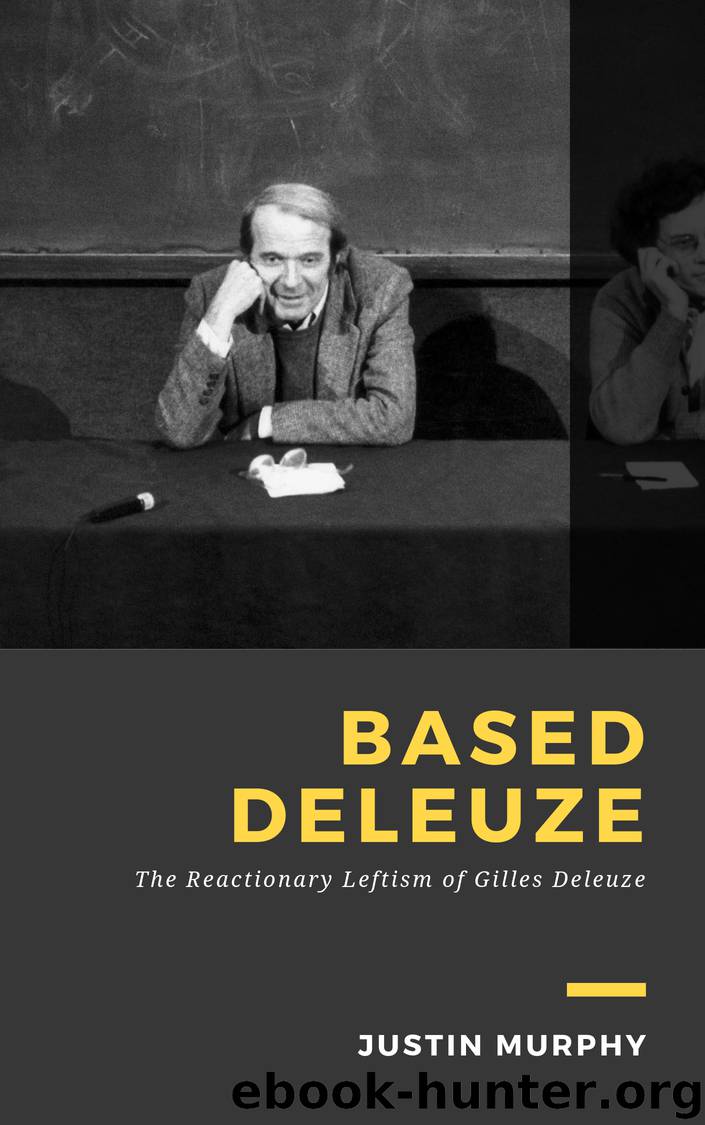Based Deleuze: The Reactionary Leftism of Gilles Deleuze by Justin Murphy

Author:Justin Murphy
Language: eng
Format: epub
Published: 2019-09-20T18:47:31+00:00
Against Maximum Deterritorialization
Jordan Peterson is known for his conservative fears of radical-left excess — that young “social justice warriors” roaming college campuses might soon be erecting national gulags. Although they are not known for it, Deleuze and Guattari are equally concerned about the excesses of naïve radical leftism. Given the preceding analysis of a substantial theoretical overlap between Deleuze and Peterson, it is plausible that they all feared radical Left excesses for the same basic reasons.
According to Peterson and Carson (Peterson and Carson 2000), schizophrenia is generated in part by a combination of high Openness and low Intelligence. Creativity, on the other hand, is generated in part by the combination of high Openness and high Intelligence. In short, if your Latent Inhibition is low so that your “gate” allows in a lot of affectively charged information, you are likely to become either creative or insane — depending on your level of intelligence.
Deleuze obviously had no access to these scientific literatures, which would only be developed later. However, his empirical intuitions are uncannily prescient and consistent with Peterson’s model, although Deleuze and Guattari are more interested in extrapolating the political implications. Deleuze and Guattari observe that it is the most radically creative or “deterritorializing” individuals and groups who unleash the flows most likely to backlash or “reterritorialize” pathologically. They do not explicitly refer to intelligence as a moderating variable, but this is no wonder given their political context and how much intelligence research was still yet to come. Nonetheless, Deleuze and Guattari implicitly invoke intelligence as a moderating variable in their socio-political models. For instance, consider the passage below, in which they distinguish between the creativity of merchants and the dependency of the bureaucrats and peasants.
It is precisely the most deterritorialized flow, under the first aspect, that always brings about the accumulation or conjunction of the processes, determines the overcoding, and serves as the basis for reterritorialization under the second aspect (we have already encountered a theorem according to which it is always on the most deterritorialized element that reterritorialization takes place). For example, the merchant bourgeoisie of the cities conjugated or capitalized a domain of knowledge, a technology, assemblages and circuits into whose dependency the nobility, Church, artisans, and even peasants would enter. It is precisely because the bourgeoisie was a cutting edge of deterritorialization, a veritable particle accelerator, that it also performed an overall reterritorialization (1987, 220–21).
Download
This site does not store any files on its server. We only index and link to content provided by other sites. Please contact the content providers to delete copyright contents if any and email us, we'll remove relevant links or contents immediately.
| Anarchism | Communism & Socialism |
| Conservatism & Liberalism | Democracy |
| Fascism | Libertarianism |
| Nationalism | Radicalism |
| Utopian |
The Secret History by Donna Tartt(19052)
The Social Justice Warrior Handbook by Lisa De Pasquale(12187)
Thirteen Reasons Why by Jay Asher(8893)
This Is How You Lose Her by Junot Diaz(6877)
Weapons of Math Destruction by Cathy O'Neil(6265)
Zero to One by Peter Thiel(5786)
Beartown by Fredrik Backman(5737)
The Myth of the Strong Leader by Archie Brown(5499)
The Fire Next Time by James Baldwin(5431)
How Democracies Die by Steven Levitsky & Daniel Ziblatt(5215)
Promise Me, Dad by Joe Biden(5141)
Stone's Rules by Roger Stone(5081)
A Higher Loyalty: Truth, Lies, and Leadership by James Comey(4954)
100 Deadly Skills by Clint Emerson(4921)
Rise and Kill First by Ronen Bergman(4779)
Secrecy World by Jake Bernstein(4741)
The David Icke Guide to the Global Conspiracy (and how to end it) by David Icke(4707)
The Farm by Tom Rob Smith(4502)
The Doomsday Machine by Daniel Ellsberg(4484)
